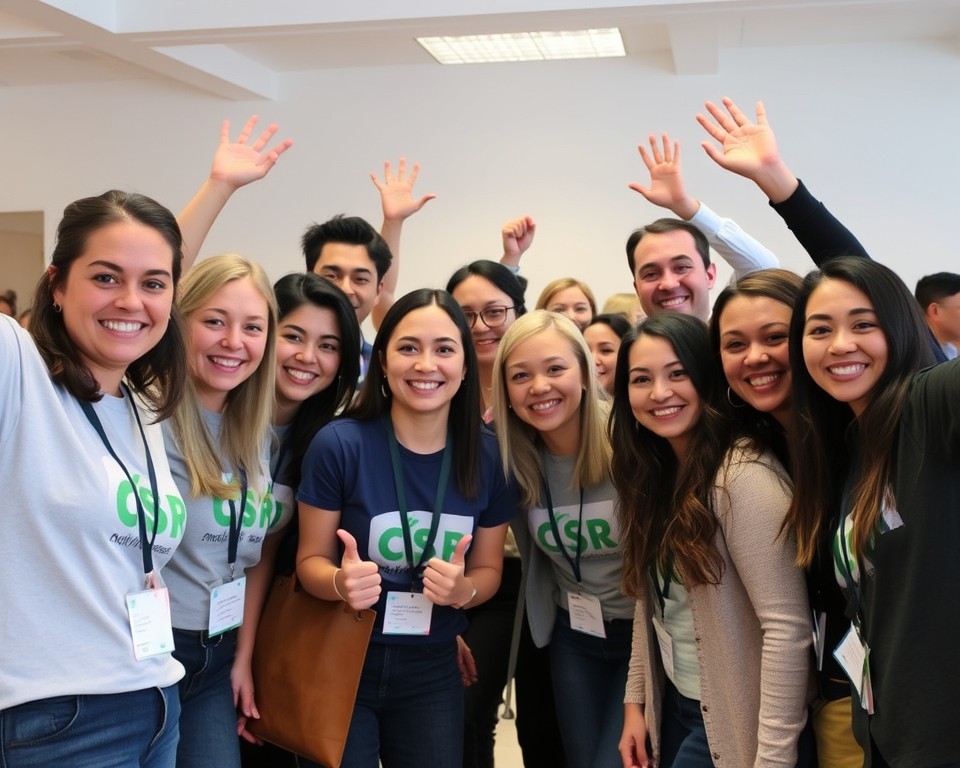
The concept of CSR has increasingly over the past few years shifted from a glamor to become a necessity for companies in the global market. Thus, through the incorporation of social and environmental themes into the formation and continuation of employee teams, organizations can support both a developing, pleasant, and productive organizational climate, as well as contribute to social changes. This blog explores why CSR team-building activities are popular among corporates and how they benefit both companies and employees.
What Are CSR Team-Building Activities?
CSR team-building activities are events and projects that involve the teams to create a positive impact on a specific community or environment and let the teams work together. While the traditional approach to team building is about creating satisfaction derived exclusively from intragroup dynamics, CSR based activities introduce an additional, external positive outcome as it is charitable. Group activities involving indoor charity donations are well-known types of CSR, as well as physical outdoor activities like cleaning up or planting trees for a team for instance.

Key Reasons Why CSR Team-Building is Popular Among Corporates
1. Enhancing Brand Image and Corporate Reputation
Research shows that customers’ perception of companies that engage in CSR is generally positive from customers, investors, and the community. Engaging in CSR related corporate team building events in Bangalore or other important areas demonstrates a company’s concern for the society hence making its reputation among consumers and partners better.
2. Boosting Employee Morale and Engagement
Ensuring that employees engage in socially responsible actions helps the employee feel proud of the organization. CSR makes a link between personal beliefs and organizational roles to foster work contentment and employee satisfaction. There is nothing more satisfying than working for a company that supports a cause that you believe in Johns (2006).
3. Strengthening Team Dynamics and Communication
CSR activities afford employees a way to work with other employees in different settings than their normal work places and which is healthy for the relations of the employees. Doing team activities outdoors or volunteering for a specific reason goes a long way in down-playing hierarchies between subordinates and their bosses, making them work together more closely.
4. Aligning with Corporate Values and Goals
Most organizations have corporate values that include; responsibility, sustainability and integrity. Thus, CSR team-building activities are quite in tune with such values as it helps convey them through practice. Others are that it enhances the overall corporate culture since people feel that the organization is doing what it has said.
5. Attracting and Retaining Top Talent
There exists today a number of applicants who are ready to work for any company and are concerned with corporate conscience. Employers visibly involved in CSR programs manage to attract employees seeking employers with more than mere economic interests. Furthermore, there is increased morale felt by the current employees because they feel appreciated thus eradicating frequent ‘’employee turnover’.
6 Popular CSR Team-Building Activities
1. Environmental Clean-Up Events
Organizing team clean-up events in public areas like parks, beaches, or local neighborhoods allows employees to work together on a meaningful project that benefits the environment. It’s a great team-building exercise that offers immediate, visible results and a sense of shared accomplishment.

Immediate Impact: Seeing a visibly cleaner environment after the event gives employees a sense of achievement and shows the positive impact of their efforts.
Raises Environmental Awareness: Participating in these activities increases awareness of environmental issues and encourages eco-friendly behavior in daily life.
Physical Activity and Team Bonding: Clean-up events require physical activity, which boosts energy and provides an enjoyable way to bond outside the office.
Community Partnerships: Partnering with local environmental organizations for these events strengthens the company’s ties with the community and boosts its reputation.
2. Charity Fundraisers and Donation Drives
Fundraisers and donation drives bring employees together for a charitable cause. These events can be made fun and competitive, as different departments or teams compete to see who can raise the most funds or collect the most donations.

Friendly Competition: Turning fundraisers into team competitions keeps everyone motivated and engaged, as teams aim to outdo one another in raising funds or collecting donations.
Showcasing Creativity: Fundraisers often allow employees to get creative with activities like bake sales, auctions, or fun runs, giving everyone a chance to showcase unique talents.
Long-Term Charity Partnerships: Regularly supporting the same charity can build a strong, ongoing relationship that reflects positively on the company.
Employee Pride and Morale Boost: Employees feel proud of their collective efforts in supporting a meaningful cause, which can improve job satisfaction and strengthen team spirit.
3. Volunteering Days
Volunteering days offer employees the chance to work hands-on with local organizations or communities, providing immediate, visible support to those in need. Whether it’s at shelters, schools, or community centers, volunteering helps employees feel connected to the cause and to each other.

Hands-On Experience and Fulfillment: Volunteering directly with beneficiaries offers a sense of fulfillment and allows employees to make a personal, meaningful impact.
Strengthens Team Skills: Volunteering activities often require teamwork, communication, and patience, which are great skills to bring back to the workplace.
Fosters Empathy and Understanding: Exposure to diverse communities and challenges builds empathy, enhancing emotional intelligence within the team.
Customizable Opportunities: Volunteering days can be tailored to align with employee interests, from helping with education programs to engaging in environmental projects.
4. Skills-Based Volunteering
Skills-based volunteering allows employees to use their professional expertise to benefit nonprofit organizations. For example, marketing teams might assist with promotional campaigns, or IT teams could help set up technical systems for a charity.

High-Impact Contribution: Using professional skills, employees can make a meaningful and lasting impact on a nonprofit’s operations.
Boosts Confidence and Morale: Employees feel proud and confident when they see their skills benefitting a worthwhile cause outside of the workplace.
Enhances Collaboration: Working on a challenging project for a nonprofit helps team members collaborate and sharpen their project management skills.
Company Expertise on Display: Skills-based volunteering not only benefits the nonprofit but also enhances the company’s reputation as a community-minded organization.
5. Mentorship Programs for Youth or Underrepresented Communities
Mentorship programs involve employees guiding students, young professionals, or members of underserved communities, helping them develop career skills, build confidence, and set personal goals.

Personal Impact: Mentoring allows employees to make a direct, positive impact on an individual’s career and personal growth.
Builds Leadership Skills: Serving as a mentor helps employees develop their leadership and coaching skills, which can benefit their own career development.
Positive Company Image: Supporting youth and underrepresented groups strengthens the company’s reputation as a positive force in the community.
Increases Employee Engagement and Retention: Employees often find mentoring roles meaningful, which boosts their sense of belonging and loyalty to the company
6. CSR-Focused Workshops and Educational Initiatives
Hosting workshops where employees teach practical skills to community members, such as financial literacy, wellness practices, or digital literacy, creates a lasting impact. These events allow employees to interact directly with the community, making a difference through knowledge-sharing.

Empowers Community Development: By providing useful knowledge, employees directly contribute to community growth and empowerment.
Enhances Visibility: Hosting these workshops establishes the company as a committed community partner, enhancing its positive image.
Boosts Morale and Satisfaction: Employees feel proud and united when helping others learn valuable life skills.
Refines Employees’ Own Skills: Teaching others often strengthens employees’ understanding and ability to present information clearly.
How CSR Team-Building Supports Corporate Goals
CSR team-building activities seem not only good for employees, but also align with various corporations’ objectives. They also increase corporate culture, improve the brand image of the company, and provide a positive contribution to society. Some empirical evidence shows that firms with effective CSR initiatives tend to be more successful than their counterparts since CSR boosts employee morale and increases customer preference.

